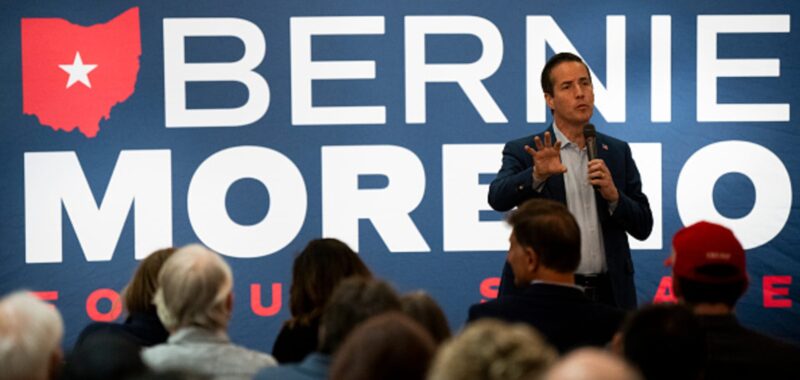Republican Senator-elect Bernie Moreno, who made his living as a luxury car dealer before running against and defeating Democrat Sherrod Brown in the large manufacturing state of Ohio, said he is aiming to become the “car czar” within the Senate for the next Trump administration.
If Moreno is to fill that role, one of the first things he would target is eliminating the up to $7,500 tax credit that can be used to buy or lease an electric vehicle.
“At the end of the day, the $7,500 incentive is catastrophically stupid,” Moreno told CNBC D.C. Correspondent Emily Wilkins at the 2024 CNBC CFO Council Summit in Washington, D.C., on Wednesday.
Some senators, like Michigan’s Elissa Slotkin, who was criticized by her Republican challenger Mike Rogers for her support of the Biden administration’s embrace of electric vehicles, have looked to frame their support of the tax credit as a defensive move aiding the auto industry in its battle with Chinese auto manufacturers.
However, Moreno told Wilkins he views that position as “nonsense,” adding that the government should not “tell companies what to do and how to have a strategy.
“If you don’t care what kind of car they drive, then let the markets work,” Moreno said. “We’re going to let the marketplace decide what kind of cars people should drive, and if it’s electric, great.”
Moreno pushed back against the argument that reversing Inflation Reduction Act incentives like the EV tax credit would effectively cede a key technology race to China. He said that if China is “dramatically ahead of us on EVs â good for them; we’re dramatically ahead of them in terms of combustion and hybrids.”
“So as a country, where do you prefer our industry to go? The places where we have a strategic advantage and not hand an industry over to China?” Moreno said. Moreno added that a change in U.S. law as it relates to the EV incentives is “not be handing it them” but a reflection that “consumers have spoken.”
“There’s never been a case in time where consumers have been more clear about what they want and don’t want,” Moreno said. “There’s people who EVs are great for them, and good for you, that car works for you, you should go out and buy it ⦠But for a lot of people, they don’t want it.”
The euphoria that surrounded EV investment and sales has largely died out at major auto manufacturers, and automakers from Ford Motor and General Motors to Mercedes-Benz, Volkswagen, Jaguar Land Rover and Aston Martin have announced plans to scale back or delay some electric vehicle plans.
While electric vehicle sales are still expected to increase in the coming years, the boom in consumer demand for EVs that many car CEOs expected never materialized. “What we saw in ’21 and ’22 was a temporary market spike where the demand for EVs really took off,” Marin Gjaja, chief operating officer for Ford’s EV unit, told CNBC earlier this year. “It’s still growing but not nearly at the rate we thought it might have in ’21, ’22.”
Instead, automakers are shifting their focus to a more mixed offering of vehicles with lineups of gas-powered cars alongside hybrids and EVs, rather than more towards plans like the all-electric by 2035 mandate laid out by GM CEO Mary Barra.
“We’re going to let the marketplace work,” Moreno said. “We’re going to create an environment for car companies to be able to have a good tax environment, a good regulatory environment and good workforce ⦠Let the marketplace work; stop the madness of government intervention in corporations and the marketplace will take care of it.”


